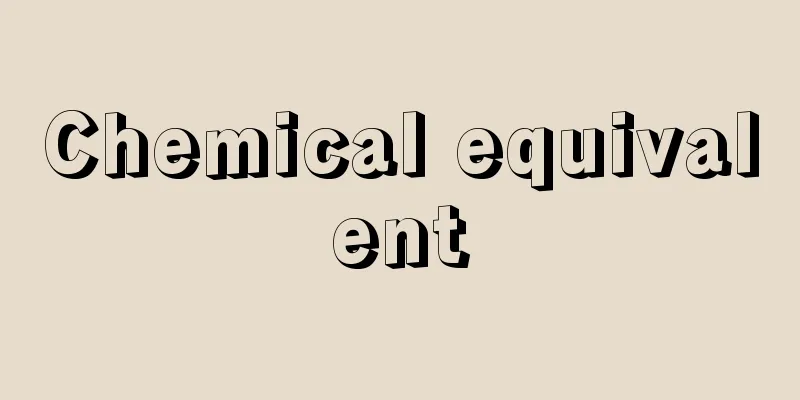Chemical equivalent

|
It is sometimes abbreviated as simply equivalent. Historically, it was a concept introduced as a standard for determining atomic weight. There are three types: (1) Equivalent of an element This refers to x, where x is the amount of another element that combines with half a gram atom of oxygen (8,000 grams). Historically, the atomic weight of other elements was determined based on hydrogen (valence 1), so the equivalent was calculated by dividing the atomic weight of the element by its valence. Atomic weight = atomic valence x equivalentThe amount of an element in grams equivalent is called 1 gram equivalent. (2) Acid/base equivalents The amount of acid that contains 1 equivalent of hydrogen is called the acid equivalent. Also, the amount of base that neutralizes it is called the base equivalent. For example, in sulfuric acid H2SO4 , there are two hydrogens that act as an acid, so the acid equivalent is 49, which is the formula weight of 98 divided by 2, and in sodium hydroxide NaOH (formula weight 40), 40 is the base equivalent. (3) Oxidation/reduction equivalent In an oxidation-reduction reaction, the formula weight of the oxidizing agent or reducing agent is divided by the number of electrons transferred in the reaction. This equivalent does not have a fixed value depending on the type of reaction and the compound. However, the "Course of Study" discourages the use of "chemical equivalents." [Takashi Shimozawa] Source: Shogakukan Encyclopedia Nipponica About Encyclopedia Nipponica Information | Legend |
|
単に当量と略することがある。歴史的には原子量を決定するための基準として導入された概念。次の3種がある。 (1)元素の当量 酸素の2分の1グラム原子(8.000グラム)と化合する他の元素の量をxグラムとするときのxをいう。歴史的には、水素(原子価1)を基準として他の元素の原子量を決めようと考えたので、その元素の原子量を原子価で割って当量としていた。 原子量=原子価×当量 (2)酸・塩基の当量 1当量の水素を含む酸の量をその酸の当量という。また、それを中和する塩基の量を塩基の当量という。たとえば、硫酸H2SO4では、酸として働く水素が二つあるので、式量98を2で割った49が酸の当量、水酸化ナトリウムNaOH(式量40)では40が塩基の当量である。 (3)酸化・還元の当量 酸化還元反応において、酸化剤または還元剤の式量を、反応で移動する電子の数で割った値である。この当量は反応の種類により、化合物によって一定値をもたない。 しかし、「学習指導要領」では「化学当量」は使用しないようになっている。 [下沢 隆] 出典 小学館 日本大百科全書(ニッポニカ)日本大百科全書(ニッポニカ)について 情報 | 凡例 |
Recommend
Saburouemon Kawakado - Saburouemon Kawakado
… [Kawazumi Taikoki] 5 volumes, 5 books. This is ...
Katholieke Volkepartij (English spelling) KatholiekeVolkepartij
...However, the relationship between the Catholic...
Viola bisseti (English spelling)
… [Yukio Taniguchi]. … *Some of the terminology t...
Kiyoyuki Miyoshi
A literary official in the early Heian period. So...
Khlynov
...Population: 491,200 (1992). Founded in 1181 as...
Biliary dyskinesia
It is also called biliary ataxia or biliary insuf...
Fiber grease
…used for automobile chassis. (3) Sodium soap-bas...
ground truth
...So-called advanced technologies such as space ...
Stone stupa - Itaishitoba
...A type of stone tower from the Middle Ages. Al...
Grattan's Parliament
The Irish Parliament, which lasted from 1782 to 18...
Co-Sponsored CM - Kyodo Teiki CM
...This is because commercial broadcasting is run...
Gold mud - Kondei
〘Noun〙 ("Kon" is the Go-on pronunciation...
Northern Rhodesia (English spelling)
Former name of Zambia, a country in south-central...
Mani (English spelling)
...A dualistic religion founded and advocated in ...
Civil Engineering Change - Doboku no Hen
This is an incident in which Emperor Zhengtong of...









